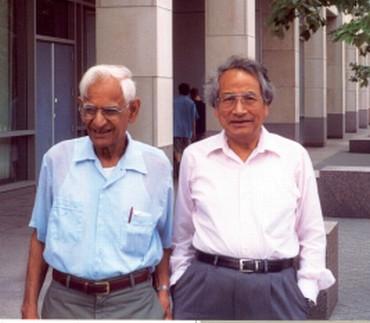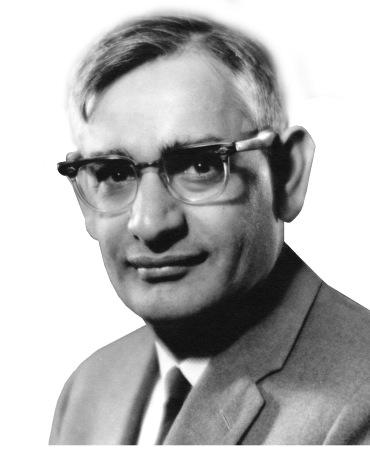Suman Guha Mozumder
Uttam RajBhandary, the Lester Wolfe Professor of Molecular Biology and Associate Head of the Department of Biology at MIT, knew Dr Har Gobind Khorana for close to half a century. Many consider him the late Nobel Laureate's closest friend and colleague. He spoke to India Abroad.
Read Part I: Dr Khorana, Nobel laureate and one of science's immortal
How and when did you come to know Dr Khorana?
I have known him for close to 50 years. I met him in 1962 and have known him since then as a mentor, as a colleague and as a very dear friend. We have been together essentially for all these years. When I was working towards my PhD in England I already knew about his work. At that time he was working in Vancouver, British Columbia.
My professor got a letter from him wanting to know whether there was anybody he could recruit from the lab in England. My professor asked me whether I was interested and the next thing I know is Dr Khorana offering me a position. I went to University of Wisconsin in 1962, and that is where I met him. I have been a friend of him ever since.
What was the first meeting like?
The first meeting was very nice. He was, as everybody knows, a very modest and humble person, very focused on his work. He greeted me and he put me at a place for three nights because I was coming from England. After a couple of days I met him and we talked about the work for me to do. It was an exciting time for me to know that I would be working on a project that he was deeply interested in.
I remember that I got the impression immediately after the meeting that here was a man who is very determined, very disciplined, and really a hardworking person. He gave me his notebooks, explained to me what he was doing exactly, and told me, 'This is your project; take it over.' There were detailed notes all over the notebook. Every day he would do experiments, and then he would go home for dinner and then come back. Every day of the week, he would work for 12 hours or more. He wanted everybody to succeed and wanted them to work hard. Everybody who worked with him knows that.
Did he have the same expectation in terms of work from everybody or was he considerate or compassionate towards fellow colleagues or students?
Oh yes. He was a very considerate man. He expected a lot from people in his lab, but he also knew that they would have problems, family problems, children problems, etc. He would be considerate, and his wife Esther was really very much like him in that regard. She helped him and cared deeply about the family members of his laboratory immensely.
Did he have time to pursue other interests besides academics?
He did whatever he could in his spare time. Although he used to work 12 hours a day, he was not really so completely immersed in science that he had no other interest. He loved Western classical music, thanks to the influence of his wife Esther I guess. He had a deep passion for nature and he would go for hiking regularly. He loved walking. His office and mine at MIT were across from each other on the sixth floor. He would walk up and down the stairs while I would always use the elevator. Until a few years ago, he never used the elevator. He was incredible.
He loved swimming as well. In fact, he had all kinds of interests. Listening and especially walking made him feel relaxed and gave him the opportunity to think deeply about science.
...
'Whatever he did, he wanted to be the best'
Image: Dr Har Gobind KhoranaWhen did you meet him last and what was the conversation like?
I think November 6, just about two-and-half days before he died. I had a cup of tea with him at hospital. That was the last time I met him. He was a little weak, but clearly in his thinking, and he was alert. He knew what he was talking about. He spoke about his days in Cambridge almost 60 years ago. I guess he was a bit nostalgic. We talked about many others things besides Cambridge.
What kind of bonds do you think he had with India?
I do not think he traveled much to India except for maybe three times after he left. Once when I was here, he went from India to Nepal to meet with my parents. But he had not severed ties with India. He had lots of friends and colleagues, mostly people who had gone through his lab and who are now established people there, scientists in their own right.
He was a private person. For someone who had accomplished what he did, he was a very modest person. He did not have any fancy cars or a big mansion. He lived a quiet, dignified and modest life. Sometimes, we would go out to Indian restaurants outside MIT and have Indian meals. Nobody knew who he was. But he was perfectly okay with that. He was fond of Indian food despite living here for so many decades.
Was his house full of books?
The place would have certainly lots of books because Esther used to read lot of books. There used to be scientific books, books on philosophy and the arts. His house had lots of paintings he got from fellow scientists. It was a house with all kinds of stuff. No matter what the topic, he always had questions, he was always eager to learn and to understand. He had an inquisitive mind that stayed with him till the end.
Did he concentrate only on his field of expertise in science?
In science he switched fields from one to another even when he was at the height of fame. He would decide to switch fields but would prepare himself thoroughly for that. He would go probably to the best labs and work there for a while to learn and then he would go back again the next year in what he called pilgrimages to the same lab for one or two months.
They (people at the lab) loved him because they felt, here was a guy who had a Nobel Prize, and he did not have to come to their lab and yet he did. When he would go to that lab he would try to learn from people, from young people — whoever was working on the project. That thing never abandoned him — the spirit of inquiry and willingness to learn.
What would be your homage or tribute to him?
I think he was a most remarkable man who really strived for excellence in whatever he did. In whatever he did, be it science, swimming, hiking, he wanted to be the best. That is what sticks with me about him the most. For a man so accomplished, he was an incredibly gentle man. He dressed himself well, but there was nothing flashy about it. He really was a down to earth person.
Khorana was not an extrovert person. He avoided publicity. But he was extremely modest. He was a pioneer in the field of his work. I think with his death, an era has ended. The legacy he left is really his scientific accomplishments that have been tremendous and all-encompassing, and the legacy of having trained hundreds of young people who are now doing really well in many different countries throughout the world. That is his true legacy.



article